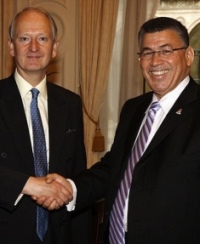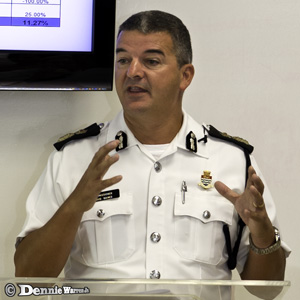Archive for February 4th, 2011

Premier to talk cash and ‘governor in cabinet’ in UK
 (CNS): The country’s premier will be heading to London next week to discuss government finances and the ongoing question of the continued use of the tern “Governor-in-Cabinet” in new legislation. McKeeva Bush leaves for Miami this weekend to meet with the Florida Caribbean Cruise Association (FCCA) before heading to the United Kingdom for a meeting with the Minister for Overseas Territories, Henry Bellingham and to sign another Tax Information Exchange Agreement (TIEA). The premier will be taking good news with him following revelations this week that the expected deficit for this financial year has turned into a surplus and that CIG many not need to increase borrowing as much as previously expected.
(CNS): The country’s premier will be heading to London next week to discuss government finances and the ongoing question of the continued use of the tern “Governor-in-Cabinet” in new legislation. McKeeva Bush leaves for Miami this weekend to meet with the Florida Caribbean Cruise Association (FCCA) before heading to the United Kingdom for a meeting with the Minister for Overseas Territories, Henry Bellingham and to sign another Tax Information Exchange Agreement (TIEA). The premier will be taking good news with him following revelations this week that the expected deficit for this financial year has turned into a surplus and that CIG many not need to increase borrowing as much as previously expected.
Bush is scheduled to meet Bellingham on Tuesday where aside from discussing the proposed framework for fiscal responsibility agreement between the Cayman Islands and the United Kingdom the premier will also seek a clarification on the use of the term “Governor-in-Cabinet” which has been a point of debate in the Legislative Assembly recently.
While in the British capital Bush will sign a TIEA with Japan bringing the number of tax deals Cayman now has to 21.
George Town, backbench MLA Ellio Solomon and Ken Jefferson the Financial Secretary will be travelling with the premier on this trip while Rolston Anglin will be Acting Premier in his absence.

PAs not disclosing enough on websites
 (CNS): Public authorities are still not disclosing information in the correct way, the information commissioner has revealed after the latest independent investigation. Although Jennifer Dilbert notes some improvement, in this latest report on the level of compliance by public bodies with the freedom of information law, many are under utilising their websites and not fully complying with their obligations. Dilbert said that the latest investigation demonstrated the persistent nature of some weaknesses and brought to light new issues. She found a failure to maintain proper contact details, update websites and disclosure logs as well some misunderstanding by information managers about treating requests formally under the law and their obligation to help applicants.
(CNS): Public authorities are still not disclosing information in the correct way, the information commissioner has revealed after the latest independent investigation. Although Jennifer Dilbert notes some improvement, in this latest report on the level of compliance by public bodies with the freedom of information law, many are under utilising their websites and not fully complying with their obligations. Dilbert said that the latest investigation demonstrated the persistent nature of some weaknesses and brought to light new issues. She found a failure to maintain proper contact details, update websites and disclosure logs as well some misunderstanding by information managers about treating requests formally under the law and their obligation to help applicants.
During the second investigation of its kind the office randomly selected ten government bodies and submitted anonymous but simple FOI requests to each one, which the information commissioner said should not have been overly burdensome. Staff then monitored the process of the requests from acknowledgement through to disclosure. In this investigation the commissioner chose to name the ten authorities and reported in detail on each FOI application and how it was handled.
The outcome was a mixed bag, with some public authorities fully complying with the law and others failing at almost every point. Dilbert commended the commissions’ secretariat, the General Registry, Land and Survey, the Sunrise Adult Training Centre and others for elements of the process but she had little praise for the Elections Office, which she said had not treated its obligations under the FOI Law with the necessary seriousness.
“In some ways this investigation contrasts favourably with the previous ICO Investigation published in September 2010, but it also demonstrates the persistent nature of some weaknesses and brings to light a number of new issues,” she said in the report. “Some IMs do not seem to understand their duty to assist the applicant and narrow down the request to determine which record (whether held by them or possibly by another PA) best answers the applicant’s question.”
Dilbert pointed out in a previous investigation that a public authority should not “hide its records and information behind mere semantics” but should communicate with the applicant and determine what they are looking for.
One issue that Dilbert said all of the authorities failed on is proper disclosure and publication information. Even the bodies which she commended for their efficiency when it came to handling the FOI requests made by her office had fallen down when it came to their websites and disclosure logs.
“Many PAs are insufficiently making use of the opportunities offered by the web to publicize FOI and increase its efficiency. While at least some information about FOI is available on the vast majority of PA websites, only a few authorities make full use of the internet to inform the public about the rules of FOI, applicants’ rights under the Law, the types of information proactively available, and previous requests and their outcomes. In particular, publication schemes and disclosure logs remain underused tools on PA websites,” she said.
Only Lands and Survey in this particular investigation provided an online link to their complete publication scheme, although the Governor’s Office spread the information across several pages on its website.
“PAs should recognize the importance of the internet and embrace the available technology to empower the user and increase the efficiency of their services, including FOI, by raising awareness and making tools such as the publication scheme and the disclosure log easily and widely available,” Dilbert added.
In 2008, Computer Services Department set up web pages for all government departments that did not already have an online presence but the report reveals that many of them have made no attempt to update them since. She described them as “essentially pointless” as the information on the sites posted in 2008 is no longer relevant.
“Inaccurate information can in fact be harmful, since it makes FOI seem less relevant and serves only to frustrate the public who is seeking information,” the commissioner warned as she added that all public authorities need to review and update their online information.
“Overall, more information should be readily available on websites. The FOI Unit should seek to coordinate the approach of PAs towards the internet, and provide central guidance encouraging PAs to put publication schemes and disclosure logs online, and keep them up to date and user friendly.”
She also recommended a complete audit of the FOI email addresses to make sure the public have access to the right contact details.
Among other recommendations Dilbert called on information managers to take-up the training offered by the freedom of information unit. “The FOI Unit coordinates courses throughout the year which are not always fully attended. PAs need to take advantage of this valuable training and ensure that they understand the FOI processes and what is required of them under the Law,” she added.
In this independent investigation the commissioner submitted anonymous information request to the following authorities:
Cayman National Cultural Foundation
Commissions Secretariat
Elections Office
General Registry
Governor’s Office
Lands and Survey Department
Public Service Pensions Board
Sunrise Adult Training Centre
Treasury Department
University College of the Cayman Islands
Art@governors expected to draw big crowds
(CNS): This year over 100 exhibitors will gather on the front lawn of Government House as well as across the street at Governor’s Square for what has become one of Cayman’s most important events on its arts calendar. Art@governor’s brings together a myriad of works by Caymanian and resident artists offer something for everytaste and appreciation. As well as an opportunity to admire the work visitors attending this Saturday will also get to meet the artists themselves who will be hosting their own exhibits. Works include fine art paintings, sculptures, jewellery, thatch art, glass art, quilting and more. The National Gallery will also be hoping to kick start it latest fundraising efforts for its new venue by asking art lovers to sponsor a custom engraved paver on the Walk of Tribute.
The event is the biggest outdoor art exhibition in the country, it is free to enter and opens at 12;30 pm on Saturday 5 February.

Telecom firm completes Caribbean network ring
 (CNS) Regional telecommunications company LIME said Friday that work was completed on the installation of the new East-West undersea cable system linking Jamaica, the British Virgin Islands and the Dominican Republic. The project cost US$35m and was described as an advancement for the Caribbean region by the firm. Completed in under six months and a week ahead of schedule, the system completes a Caribbean “network ring” that LIME said would further strengthen its position as the leading wholesale capacity provider, increasing its capability to serve customers in North and Latin America, as well as within the Caribbean.
(CNS) Regional telecommunications company LIME said Friday that work was completed on the installation of the new East-West undersea cable system linking Jamaica, the British Virgin Islands and the Dominican Republic. The project cost US$35m and was described as an advancement for the Caribbean region by the firm. Completed in under six months and a week ahead of schedule, the system completes a Caribbean “network ring” that LIME said would further strengthen its position as the leading wholesale capacity provider, increasing its capability to serve customers in North and Latin America, as well as within the Caribbean.
The East-West cable links Jamaica in the west of the Caribbean to the British Virgin Islands (Tortola) in the East, completing the connection in Santo Domingo, in the Dominican Republic. It will triple available bandwidth and reduce interconnection costs in the Dominican Republic – a key market in the region.
The new cable is the third new submarine cable built by LIME in the region since 2008, adding to the CBUS cable between Bermuda and the British Virgin Islands and the Gemini-Bermuda cable between Bermuda and the east coast of the US.
The firm said that this undersea cable enables it to meet the rising demand for high-speed bandwidth from consumers and business customers in the region. LIME operates in 13 Caribbean countries, and is developing a range of new fixed broadband and mobile data services for customers, which will require high quality capacity support.
“LIME’s network is well positioned to benefit from growth in wholesale markets. The Caribbean is a major traffic corridor between South America and the major Internet, content and carrier hubs in the United States – acknowledged as one of the fastest growing inter-continental routes in the world today,” said David Shaw, Chief Executive Officer, LIME.
Hailing the project as a text book undertaking, Shaw added, “The East-West Cable is a valuable addition to our carrier network, increasing the capability and service LIME provides to our carrier customers throughout the Americas and the Caribbean.”
Martin Fijman, Managing Director – Carrier Services, said the investment attests to the growing demand for capacity in the region. “The cable will provide leading-edge broadband capacity and reliable network services to help fulfill that market demand. LIME will keep enhancing its wholesale proposition as we keep leading the provision of capacity, connectivity and carrier services within the region,” he added.

Germany mulls financial transactions tax
 (Reuters): Chancellor Angela Merkel’s German conservative party may push for a financial transactions tax initially covering just Germany, France and Austria rather than all euro-zone states, parliamentary sources said on Friday. Sources within Merkel’s Christian Democratic Union (CDU) said the aim would still be to achieve wider adoption of the tax proposal — which has failed to gain global support — with other countries able to join later. But a spokeswoman for Germany’s Finance Ministry said the country had no plans for a so-called Tobin tax in an area smaller than the 17-country euro zone. "I can say that an introduction below the size of the euro zone does not make sense," she told a news conference, adding that talks to get the tax implemented across the European Union were continuing.
(Reuters): Chancellor Angela Merkel’s German conservative party may push for a financial transactions tax initially covering just Germany, France and Austria rather than all euro-zone states, parliamentary sources said on Friday. Sources within Merkel’s Christian Democratic Union (CDU) said the aim would still be to achieve wider adoption of the tax proposal — which has failed to gain global support — with other countries able to join later. But a spokeswoman for Germany’s Finance Ministry said the country had no plans for a so-called Tobin tax in an area smaller than the 17-country euro zone. "I can say that an introduction below the size of the euro zone does not make sense," she told a news conference, adding that talks to get the tax implemented across the European Union were continuing.
The idea of a transaction tax, often referred to as a Tobin Tax after the U.S. economist who floated it in the 1970s, has gained support since the financial crisis, although proposals for its introduction internationally have so far failed.

Big wins for the DHL Storm and Buccaneers
 (CRFU): On a beautiful afternoon to kick off the 2011 Alex Alexander Memorial Cup, the Queensgate Pigs Trotters hosted the DHL Cayman Storm at the South Sound Rugby Club. The Cayman Storm were coming off a hard fought win over the John Doak Architect Iguanas in the Heineken Charity Shield the previous week, but had come through without injuries to key players, and the game had given the chance to clean out the off season rust. By comparison the Pigs had completely rebuilt their side in the offseason with some exciting young talent, but their inspirational Captain Doug Anderson was out with the questionable excuse of getting married.
(CRFU): On a beautiful afternoon to kick off the 2011 Alex Alexander Memorial Cup, the Queensgate Pigs Trotters hosted the DHL Cayman Storm at the South Sound Rugby Club. The Cayman Storm were coming off a hard fought win over the John Doak Architect Iguanas in the Heineken Charity Shield the previous week, but had come through without injuries to key players, and the game had given the chance to clean out the off season rust. By comparison the Pigs had completely rebuilt their side in the offseason with some exciting young talent, but their inspirational Captain Doug Anderson was out with the questionable excuse of getting married.
With him were a number of key Pigs players, clearing their bench to field a team.
Despite this, the Pigs started off looking dangerous, Ian Curry, filling in forGraeme Thompson at 9 looked fast and skillful, as did their new look backline, making some early inroads into the Storm defense, and the Pigs pack looked dangerous at each scrum. Unfortunately the Pigs back row, despite having combined for 1,037 AA Caps, none of those caps were in the back row, and that made life difficult at each breakdown with the experienced Storm back row turning ball over frequently.
Former Pigs Captain, and epitome of a scrumhalf, Grammy Thompson, did his best to upset the Storm team, riling young West Indies star Josh Clarke up enough early on that Referee Alistair Robertson was forced to send him for a breather… but unfortunately it wasn’t enough. The Storm team was extremely well drilled, and despite the Pigs making their first up tackles, they were unable to slow the Storm offloading in the tackle and the support play of the experienced Storm team was excellent, leading to some early, and at times spectacular, team tries.
 The game was played at a frenetic pace, and missing so many players, the Pigs simply could not maintain enough ball to keep in the game with Storm. Despite making the best of their limited opportunities – the highlight a fantastic break that lead to a great team try by Pigs fly-half Alex Harvey – that showed how dangerous this young Pigs team can be, the Storm were comfortable winners, 73-10.
The game was played at a frenetic pace, and missing so many players, the Pigs simply could not maintain enough ball to keep in the game with Storm. Despite making the best of their limited opportunities – the highlight a fantastic break that lead to a great team try by Pigs fly-half Alex Harvey – that showed how dangerous this young Pigs team can be, the Storm were comfortable winners, 73-10.
Later in the day, The John Doak Architecture Iguanas fell to their 2nd defeat of 2011 having faltered to a well organised and powerful Krys & Associates Buccaneers team on 29 January.
Having clearly put the horrors of 2010 behind them the Buccaneers took the field with numbers to spare against an Iguana side still struggling to piece together a back line with real attacking prowess.
The Buccaneer pack, bolstered with the return of familiar faces like Richard “Grizz” Adams, Mark Stabler and Dan Anderson and a back line featuring Sam Sage and Phil O’Connor (who recently transferred from the DHL Storm) took time to gather steam but after 80 minutes ran out 25 point victors over a battered and tired Iguana side.
The Buccaneers opened the scoring first with aneasy John Murphy penalty but the Iguanas were on equal pegging shortly after to leave the score 3-3 after 20 minutes.
The game looked to be heading for a tight, low scoring affair but before the stroke of half time the Buccaneers had scored the first try of the encounter with a Jacob Philips dash over the line and with a host of substitutions, most notably in the Buccaneer front row, the Buccs were able to capitalize on the building momentum to keep the Iguanas under mounting pressure.
Phil O’Connor’s scoring prowess impressed on his debut for the Buccaneers with an opportunistic try created from an Iguana lapse in concentration. A high ball from Buccaneer scrum half Sam Sage put Iguana full back Johnny Doak under pressure to then spill the ball for a chasing O’Connor to collect and score under the posts.
Sam Sage, returning from long term injury, was instrumental for the Buccaneers and managed to put points on the board for his team much to the surprise of all in attendance as many did not expect the Buccaneer scrum half to feature for more than a few minutes (if at all) this season.
Young Tom Mann once more saved face for the Iguanas by finishing off a hard worked try which saw the ball work its way up the midfield through the hands of numerous forwards to then see fly half Marcus Cumber chip the ball into the Buccaneer try area for Mann to touch down. With a Doak conversion and the continuing display of unbreakable defence, the Iguanas had reached their final tally of 10 points.
Having lost 2 games in succession in 2011 the Iguanas will look to re-start their season with a win over a very young Pigs side that were dealt a heavy beating by the DHL Storm.
The Buccaneers on the other hand, happy with their bonus point win over the Iguanas face the DHL Storm next in what promises to be an exciting game for players and spectators and could dictate, even at this early stage who will win the league in 2011.
Next games: AA Cup 2nd Round:
5 February 2011
DHL Storm vs. Krys & Associates Buccaneers @200pm
Queensgate Pigs Trotters vs. John Doak Architecture Iguanas @4pm
All games are streamed worldwide on www.caymanrugbytv.com

Hedge funds in spotlight during SEC probe
(FT.Com): At least 15 hedge funds improperly received corporate secrets from company officials, according to securities regulators investigating alleged insider trading on Wall Street, expanding the number of money managers under government scrutiny. The Securities and Exchange Commission filed civil securities fraud charges on Thursday accusing two consultants with expert network firm Primary Global Research and four company employees with providing non-public information about earnings and technology products to hedge funds and others.

Rights commission raises concerns on laws
 (CNS): The local Human Rights Commission (HRC) has raised questions in its first annual report about a number of laws, in particular the police bill, which it says confers additional powers on officers without fundamental safeguards. As the country makes preparations for the implementation of a bill of rights in 2012, the HRC has been examining existing and proposed legislation to ensure that the laws of the land will be compliant with the bill. Although the commission said that the law, which is based on the UK’s Criminal Evidence Act, has the potential to restore public confidence in the police, the lack of a detailed code of practice for the RCIPS to support the additional powers provided to law enforcement “causes great concern”.
(CNS): The local Human Rights Commission (HRC) has raised questions in its first annual report about a number of laws, in particular the police bill, which it says confers additional powers on officers without fundamental safeguards. As the country makes preparations for the implementation of a bill of rights in 2012, the HRC has been examining existing and proposed legislation to ensure that the laws of the land will be compliant with the bill. Although the commission said that the law, which is based on the UK’s Criminal Evidence Act, has the potential to restore public confidence in the police, the lack of a detailed code of practice for the RCIPS to support the additional powers provided to law enforcement “causes great concern”.
The commission noted that the necessary and fundamental safeguards are absent from the Cayman Islands legislation. Although the bill has now been passed in the Legislative Assembly, as yet there are no guidelines in place akin to those in the UK that highlight the responsibilities of officers in light of their new powers.
During its examination of the Criminal Evidence (Witness Anonymity) Bill 2010, which has now been passed, the HRC also pointed out problems that government may encounter with that bill when it comes to a defendant’s right to a fair trial and conflict with human rights.
The law now allows for certain witnesses to give evidence in a court anonymously. However, so far attempts by the crown to use the law have been overturned by the courts. The HRC has warned that the bill raises constitutional, legislative and human rights issues. “The HRC asserts that the right of those being prosecuted to know who is making the accusation against them is a fundamental one,” the commission stated in its report.
One law for which some of the HRC’s advice to the Attorney General’s Chambers was directly heeded was the Criminal Procedure Code; the proposal that defendants would lose the right to elect trial by jury in any case involving firearms was rejected. Although the law was passed last month abolishing the right of defendants to a preliminary enquiry in category A offences, the right to trial by jury has been maintained.
Aside from reviewing around nine pieces of legislation, the commission has also offered its thoughts to government on the regulations and code of practice which will guide the procedures surrounding the imminent introduction of CCTV to Cayman’s streets. The commission has stated that the implementation of the system should reflect the fundamental right to privacy and that the system will be subject to a statutory regulation and licensing system.
The commission has pointed out that the country needs a data protection law to balance the right to privacy against the operation of the CCTV system.
The country’s preparation for the bill of rights is going beyond the need to review laws and into the workings of the civil service. Speaking in the Legislative Assembly during the last meeting, the deputy governor said the public sector had already begun human right training of staff throughout the service.
“We have 24 months to prepare the public service and I have established a group to develop an implementation strategy plan,” Donovan Ebanks told legislators, adding that the impact of section 19, which covers the way government carries on its business, is significant for all public employees.

Cops target 2nd hand shops
 (CNS): The country’s top police officer has said that there needs to be a new law passed as quickly as possible to regulate the purchase of second hand jewellery by dealers in order to stop thieves from fencing their ill-gotten gains through these stores. Police Commissioner David Baines said recently that stolen goods are finding their way into these stores, so there is a need to compel businesses to log the details of the people they buy from and to prevent the dealers from melting down jewellery for at least seven days. (Photo Dennie Warren Jr)
(CNS): The country’s top police officer has said that there needs to be a new law passed as quickly as possible to regulate the purchase of second hand jewellery by dealers in order to stop thieves from fencing their ill-gotten gains through these stores. Police Commissioner David Baines said recently that stolen goods are finding their way into these stores, so there is a need to compel businesses to log the details of the people they buy from and to prevent the dealers from melting down jewellery for at least seven days. (Photo Dennie Warren Jr)
The theft of jewellery was not a common occurrence in the past in Cayman but now that several “cash for gold/jewellery” stores and other second had traders have emerged burglars are using these establishments to offload the stolen items, which are either sold on or melted down.
Baines explained that while local burglars once focused on cash and electrical goods the police are seeing a lot more jewellery being stolen now as well.
“One trend that has become apparent is that there’s been a shift in the types of property burglars are looking for. Electronic items and cash are still being taken, but now, more than ever, we’re seeing burglars take jewellery. We have over the past few months recovered some stolen items from businesses which specialise in buying and selling second hand electrical equipment and jewellery,” the commissioner said recently.
He said that, as a result of this latest criminal development, the RCIPS is now in discussion with the Legal Department with a view to “placing additional responsibility on second-hand dealers and pawn shops to produce comprehensive records to the police on demand.”
Baines also said he wanted to prevent the disposal of melting of breaking down of property for at least seven days after the dealers have purchases goods. “These proposals would protect the consumer and the outlets, as well as making it much more difficult for people to make a quick buck from stolen property,” Baines stated.
Speaking to members of the Chamber of Commerce during the recent ‘Be Informed’ series, Baines said it was important that these businesses assist the police with appropriate record keeping about who sold them the goods and the registration plate of the car they came in.
“We don’t want to deny people the lawful right to trade in second hand goods but we need businesses to act legitimately,” he added. The commissioner said that if the stores were to keep proper records then they could demonstrate that they were trading lawfully and they would then be free to sell on or melt down the property they had bought.
However, he said where dealers were consistently found with stolen goods and suspected to be trading in stolen goods the police would act. “We have already recovered stolen goods from second hand stores and … I am now going to write to the shops,” he said.
The commissioner said it was about people acting reasonably but once legislation was in place it would be easier to see where business were not being responsible. Baines noted that with the changing dynamics of criminality the police had to be able to move quickly to address trends and it this case it would require legislative support. While the registering and logging of second hand goods sales was new to Cayman, it was widely used in other jurisdictions.

Anglin promises stability
 (CNS): The education minister has said there is a need to stabilize the country’s education system as a result of strategy overload and confusion among teachers. Rolston Anglin said that while his predecessor had instigated lots of conversation when he was in office he said there was very little consultation with teachers. The minister said that his new stabilisation plan for education differs from the national consensus on education drawn up by the previous minister because it will involve input from teachers. Anglin also said that some individuals put in place by the previous minister had “wreaked havoc on the system” as they were the wrong people in the wrong posts leading to structural “dysfunction.”
(CNS): The education minister has said there is a need to stabilize the country’s education system as a result of strategy overload and confusion among teachers. Rolston Anglin said that while his predecessor had instigated lots of conversation when he was in office he said there was very little consultation with teachers. The minister said that his new stabilisation plan for education differs from the national consensus on education drawn up by the previous minister because it will involve input from teachers. Anglin also said that some individuals put in place by the previous minister had “wreaked havoc on the system” as they were the wrong people in the wrong posts leading to structural “dysfunction.”
The minister told CNS that he believed that his plan was focused on the bigger picture and that it would give teachers the opportunity to have direct input on what was happening and give them a clear direction on where education was going. The creation of a consultative council, he said, would enable the profession to communicate directly with him and for educators to have real input on policies before they were implemented.
The current education minister stated that when he came to office teachers’ morale was at an all time low because they were being bombarded by change when there had been no proper planning or training for that change and they did not feel as though they had been consulted.
He said that the previous minister had raised the expectations among teachers with the national conference and a lot of conversation but they had been let down by the reality, which did not involve them. “After the 2005 conference the profession was on a high as they felt something big was going to happen,” Anglin stated. “But in the end that were let down as dictat after dictat was thrown at them. There may have been lots of conversation but there was no real consultation.”
Teachers, Anglin said, were being constantly told to implement new strategies that they were not trained for and that there had been inadequate professional, development and training to help teachers implement the changes. Change was being forced upon teachers, he said, without any plans for that change being made.
He also accused the minister of running a dysfunctional team, when he said a small number of individuals “wreaked havoc with the system”. The minister would not say who they were but stated some were civil servants who were still in the ministry but had been moved to posts that better suited their skills, as well as some consultants. Anglin said that he had put the right people in the right place within the education department.
Anglin denied that the latest plan was simply change for change’s sake or an attempt to undermine the previous minister in order to make his own mark on the country’s education system, but he said it was being implemented because he believed there was a need to stabilise a system that in large measure had crashed. He said the plan would document the priorities identified by the educators for improving the system.
"This plan documents the choices we made since 2009 after consultation with teachers, students, parents and other education stakeholders," he said. "It responds to the many pressing needs and challenges, and aims to create a stable foundation for further work".
The plan, he said, would set the strategic direction for the system making it clear "where we are, where we are going and why", as he said that was lacking in the previous efforts at reform.
Despite stating that teachers were suffering from strategic overload, he said the plan was the forerunner of a National Strategic Plan, which in turn will build on the Stabilisation Plan, taking a longer-term perspective.
The Education Stabilisation Plan is organised under four broad priority areas, the minister explained: "Enhancing Leadership and Governance", "Enhancing Student Performance", "Enhancing Skills for Work Readiness", and "Improving and Expanding Early Childhood Care and Education".
Every educator in the government system has now received copies of the plan, which is in draft format, to allow for feedback. Also distributed were copies of an Education Progress Report, which he said documents the progress that has been made since 2009 against the priorities identified in the Plan.
“Our challenge is to build, implement and support an education system that creates citizens who can contribute to the economic and social growth of the Cayman Islands,” Anglin stated. “We are not going to see the benefits of these new programmes tomorrow, but we’re about to embark on something that will be meaningful and exciting and that will have a profound impact.”
He said he wanted a world class education system for Cayman and that would be measured by the eventual world class outcomes.
To see the Education Stabilisation Plan and Education Progress Report go to www.education.gov.ky